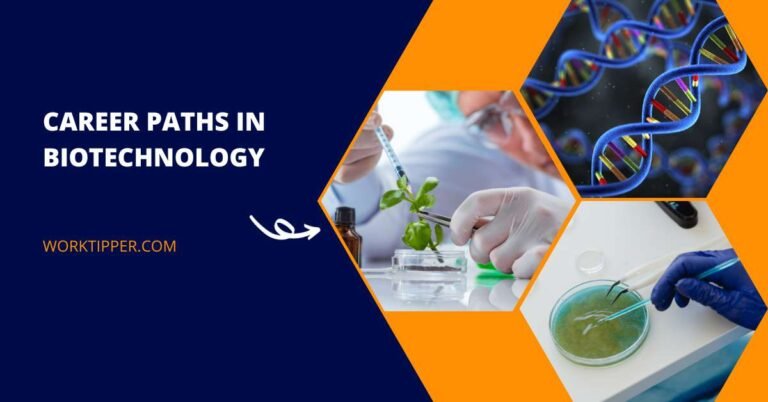
In the rapidly evolving landscape of biotechnology, where scientific innovation intersects with industry demand, understanding the employment outlook is crucial for professionals seeking thriving and sustainable careers. In this comprehensive guide, we will explore the employment landscape for career paths in biotechnology, highlighting key trends, challenges, and strategic pathways for success. Let’s embark on a journey through the intricate world of biotechnology employment, leveraging insights to navigate this dynamic field with confidence.
The Biotechnology Industry: career paths in biotechnology
Biotechnology, often regarded as the frontier of scientific advancements, encompasses a diverse range of fields, including pharmaceuticals, agriculture, environmental sciences, and more. As breakthroughs continue to reshape the industry, the demand for skilled professionals remains robust, making biotechnology a promising career choice.
Current Trends in Biotechnology Employment
1. Increasing Demand for Specialized Skills
In the realm of biotechnology, the landscape is becoming increasingly specialized. Employers are seeking professionals with expertise in areas such as gene editing, bioinformatics, and personalized medicine. Staying updated on these emerging trends and acquiring specialized skills will be pivotal to explore career paths in biotechnology.
2. Integration of Artificial Intelligence (AI) and Big Data
The convergence of biotechnology with AI and Big Data is transforming research and development processes. Professionals adept at harnessing the power of data analytics and AI algorithms find themselves in high demand. The ability to navigate and interpret complex datasets becomes a valuable asset in this data-driven era.
3. Focus on Sustainable and Ethical Practices
As societal awareness grows, there is a notable shift towards sustainable and ethical practices in biotechnology. Companies are increasingly prioritizing environmentally friendly processes, creating a demand for professionals versed in ethical considerations and sustainable innovations.
Key Biotechnology Careers: Employment Prospects and Challenges
1. Research Scientists and Biotechnologists
Prospects:
The backbone of the industry, research scientists and biotechnologists drive innovation. With an increasing focus on personalized medicine and genetic therapies, the demand for professionals in these roles is projected to rise.
Challenges:
Navigating the complexities of rapidly evolving technologies requires continuous upskilling. Professionals in research roles must adapt to new methodologies and stay at the forefront of scientific advancements.
2. Bioinformatics Specialists
Prospects:
Bioinformatics specialists play a pivotal role in analyzing complex biological data. The integration of AI and Big Data in biotechnology amplifies the demand for professionals skilled in bioinformatics.
Challenges:
Keeping pace with advancements in both biology and technology poses a challenge. Continuous learning and interdisciplinary knowledge become essential for sustained success.
3. Regulatory Affairs Professionals
Prospects:
With the biotechnology industry subject to stringent regulations, the demand for regulatory affairs professionals is on the rise. These experts ensure compliance with evolving regulatory frameworks.
Challenges:
Staying updated on ever-changing regulations and navigating the complexities of international compliance require a keen eye for detail and adaptability.
Strategies for Success in Biotechnology Careers
1. Lifelong Learning and Professional Development
Continuous learning is the linchpin of success in the biotechnology industry. Professionals must embrace a mindset of lifelong learning, staying abreast of industry advancements through workshops, courses, and certifications.
2. Networking and Industry Engagement
Building a robust professional network is invaluable in biotechnology. Attend industry conferences, connect with peers, and engage with industry experts. Networking opens doors to collaboration, mentorship, and new career opportunities.
3. Flexibility and Adaptability
Given the rapid pace of change in biotechnology, professionals must be adaptable. Embrace flexibility, be open to interdisciplinary collaborations, and cultivate a proactive approach to change.
4. Ethical Considerations and Sustainability
As the industry places greater emphasis on ethical practices and sustainability, professionals should align themselves with these principles. Integrating ethical considerations into decision-making and championing sustainable practices contribute to long-term success.
Conclusion
In conclusion, the employment outlook for biotechnology careers is undeniably promising, driven by technological advancements, increasing specialization, and a growing emphasis on ethical and sustainable practices. By staying informed about industry trends, navigating challenges with resilience, and implementing strategic career-building approaches, professionals can carve out fulfilling and impactful careers in this dynamic field. The key lies in continuous learning, adaptability, and a proactive engagement with the ever-evolving landscape of biotechnology. Keywords: Biotech employment outlook, career-building strategies, continuous learning in biotech.